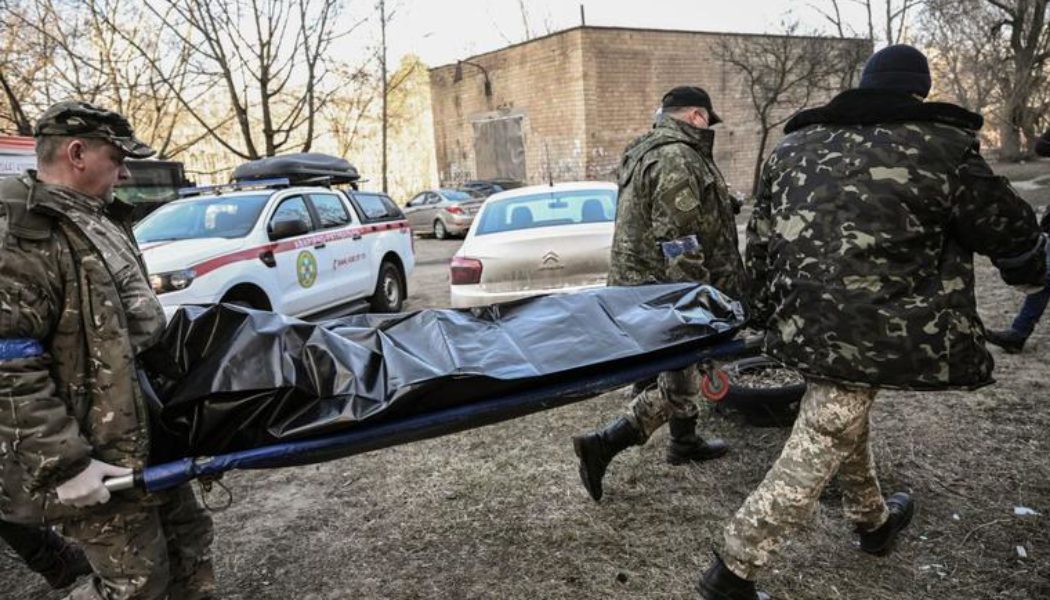
The story could not be more tragic. Pulitzer Prize-winning photographer Lynsey Addario captured the aftermath of a Russian mortar attack on four innocent civilians in Irpin, a suburb of Kyiv: a mother, Tetiana Perebyinis, and her two children, Mykyta and Alisa, and another civilian, a church volunteer. All were killed, victims of indiscriminate, immoral, illegal acts by Russian invaders.
The New York Times carried the picture. Later, Serhiy Perebyinis, the husband and father, discovered that his family was killed as the photo was shared on Twitter.
They say a picture paints a thousand words. This picture led to the worldwide condemnation of Russian cruelty and their willingness to target noncombatants. Some attack Addario for taking the photo. She defended herself by saying she was documenting a war crime: “I thought, you know, it’s disrespectful to take a photo, but I have to take a photo — this is a war crime.”
Noncombatant Immunity
It is always and everywhere immoral to directly attack innocent human life. This moral truth can be known by human reason and is part of what philosophers call “the natural law.” In Catholic theology it is an infallible teaching of the ordinary magisterium of the Church. St. John Paul II declared in Evangelium Vitae, 57:
“Therefore, by the authority which Christ conferred upon Peter and his Successors, and in communion with the Bishops of the Catholic Church, I confirm that the direct and voluntary killing of an innocent human being is always gravely immoral. This doctrine, based upon that unwritten law which man, in the light of reason, finds in his own heart (Romans 2:14-15), is reaffirmed by Sacred Scripture, transmitted by the Tradition of the Church and taught by the ordinary and universal Magisterium.”
This teaching underlies the just-war theory (jus in bello) of noncombatant immunity.
Noncombatant immunity, understood as the protection of civilian populations, civilian objects and individual civilians, is codified in numerous international agreements, most notably in the Geneva Conventions of 1949 and the Additional Protocols of 1977. These conventions outlaw the direct targeting of civilians and indiscriminate attacks. To violate these norms is a war crime. Even in war, the application of the use of deadly force must be a matter of military necessity, discriminate and proportional.
Who Is a Noncombatant?
In Catholic just-war theory, we often use the term “innocent” to distinguish noncombatants from combatants. In this setting, innocent does not refer so much to moral rectitude (after all, we are all sinners) as it does to the original meaning of the word “innocent.” The English term developed from the Latin in (not) + nocere (to harm). An innocent person in this sense is one not involved in “harming” the other side; in other words, the person is not directly involved in the ongoing military action against the opponent’s military. This is why it can be justified to attack a munitions factory, assuming other just-war criteria are met, while employees are working but not while they are at home.
At home they are not involved in the ongoing military activity. Members of the military, except those whose status identifies them as noncombatants (POWs, the wounded, chaplains, medical personnel, etc.) are considered combatants 24/7. They are considered always involved in the ongoing action.
The Role of Noncombatants
Civilians are not directly involved in war. They should be protected no matter which side has control of any given territory. Their evacuation from active battlefields and disputed areas should be respected and aided. Every reasonable effort to afford them safe passage should be made. They, of course, must never be the subject of direct or indiscriminate attack.
Even in antiquity, the laws of siege and blockade demanded the respect of civilian populations and the provision of safe passage. While these norms were all too often ignored by the wicked, part of the judgment of history relies heavily upon how a military commander treated prisoners, civilians, the wounded and other noncombatants. Many of the war-crime charges at the Nuremburg trials stemmed from violation of these moral truths.
For their part, noncombatants forfeit their immunity if they take up arms, provide a place for armaments or begin to sabotage the enemy. Spies, spotters and other intelligence agents also lose any civilian immunity.
Russia’s Crime of Aggression
Russia has already committed the crime of aggression. Vladimir Putin, other senior government and high-ranking military officials could well be liable for trial at the International Criminal Court at The Hague, Netherlands.
In addition, the direct targeting of civilians, like the Perebyinises, is a war crime. So is the targeting of hospitals, schools and civilian nuclear power plants. Russia should stop its aggression. It should retreat to its own borders. It should begin an immediate cease-fire.
From a moral perspective, as an unjust aggressor, the only proper action for the Russian military is to cease its aggression. For Ukraine, it has the right and duty to defend itself and the innocent among them. Evacuation of civilian areas under siege would most likely be the most prudent course of action. Even in their justified defensive action, military force must be discriminate, limited to what is necessary and targeted only against combatants.
Innocents’ Suffering and Death
War is always a defeat for humanity for numerous reasons. All of us are called to be peacemakers (Matthew 5:9) to avoid the great tragedy of war.
The fact that so many innocent men, women and children suffer so greatly during and in the aftermath of war is the reason that we must work tirelessly to end the scourge of war. The National World War II Museum estimates that there were 15 million battlefield deaths in World War II. This number is staggering. But at least three times as many civilians (45 million people) were killed because of World War II. Some estimates are even higher.
If anything good can come from this current evil, I hope and pray that the world will see clearly the ugliness of evil and once and for all renounce the crime of aggression, universally agree to abolish any and all weapons of mass destruction, and commit to united efforts to enforce the U.N. Charter Article 2 requirement that “all members shall settle international disputes by peaceful means.”
War and the rumor of war and all the ravages that it entails must be abolished. As President John F. Kennedy eloquently proclaimed at the United Nations on Sept. 25, 1961: “The weapons of war must be abolished before they abolish us.”
Join Our Telegram Group : Salvation & Prosperity








